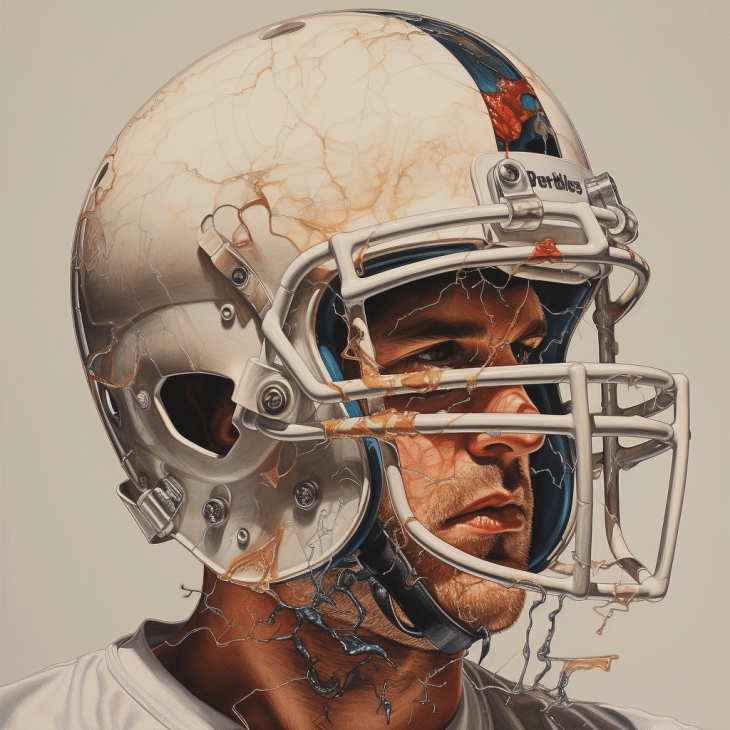A new study provides evidence that an inflammatory process in the brain continues for months or years after a sports-related concussion in athletes who develop persistent symptoms after the injury.
This suggests neuroinflammation may play a role in prolonged concussion recovery.
Key Facts:
- Athletes with concussion symptoms lasting 6+ months exhibited elevated levels of 8 inflammatory markers in their cerebrospinal fluid (CSF) compared to controls.
- 42% of athletes with persistent concussion symptoms showed cognitive impairment on testing.
- Athletes reported a median of 19 symptoms, most commonly headache, fatigue and sleep disturbances.
- Findings indicate neuroinflammation may be an important factor in prolonged post-concussion syndrome.
- Anti-inflammatory treatments could be beneficial for concussion recovery based on these results.
Source: Journal of Neuroinflammation 2023
Sports Athletes & Concussions (Study)
A mild traumatic brain injury known as a concussion, often caused by contact sports, can trigger an inflammatory process in the brain that may continue for months or years after the initial injury.
A new study documented signs of ongoing neuroinflammation in athletes suffering from persistent post-concussion symptoms.
The study examined cerebrospinal fluid (CSF) from 24 athletes with concussion symptoms lasting at least 6 months after their most recent sports-related concussion.
It compared levels of inflammatory markers to 12 healthy athletic controls.
Evidence of Prolonged Brain Inflammation
The key finding was that 8 out of 25 evaluated inflammatory mediators were significantly increased in the CSF of symptomatic athletes compared to controls.
This implies a chronic inflammatory response in the brain long after the concussive impacts occurred.
Some of the elevated markers like IL-2, TNF-alpha and VEGF are known to have pro-inflammatory effects and have been linked to neurotoxicity and neural damage.
The researchers suggest this persistent inflammation could exacerbate the initial concussion injury, leading to prolonged symptoms and impaired recovery.
Severe & Persisting Concussion Symptoms
The athletes in the study had sustained a median of 5 previous concussions, with the most recent occurring a median of 17 months prior to evaluation.
All reported significant ongoing concussion symptoms that interfered with sports, work, school and social activities.
On average, the athletes exhibited around 19 different symptoms – according to a checklist.
The most frequently reported symptoms were headache, fatigue, sleep disturbances, difficulty concentrating and light sensitivity.
42% of the athletes exhibited cognitive impairment on neuropsychological testing, performing 1.5 standard deviations below normal limits.
Concussion Linked to Secondary Brain Injury
Concussion is thought to damage axons and initiate inflammatory processes in the brain.
Studies show this can trigger a neuroinflammatory cascade within minutes that may continue for months or years after the initial blow.
This prolonged inflammation is believed to cause secondary injury to neurons and other brain cells.
It is associated with glial scarring, beading of axons, DNA damage and potential neurodegeneration.
Animal models have also demonstrated ongoing white matter degradation and neuroinflammation lasting up to a year after repeated mild traumatic brain injury similar to sports concussions.
Anti-Inflammatory Treatment – A Potential Avenue
Authors propose that the elevated inflammatory response found in athletes with persistent concussion syndrome may be exacerbating ongoing brain injury.
This raises the possibility that anti-inflammatory interventions (e.g. medications) could help improve outcomes.
However, further research is needed to establish whether neuroinflammation is directly contributing to prolonged symptoms versus just being an epiphenomenon.
Future studies should also test if and when anti-inflammatory treatments may be beneficial.
Concussion Study: Details & Limitations
Researchers recruited 24 athletes with debilitating concussion symptoms lasting over 6 months from sports medicine clinics in Sweden.
12 healthy athletic controls who exercised minimally were matched by age and sex.
CSF was sampled via lumbar puncture and analyzed for levels of 27 inflammatory markers using an ECLIA (electrohemiluminescence) assay.
Athletes also completed concussion symptom checklists and cognitive testing.
Limitations include the small sample size, lack of concussed athletes without prolonged symptoms for comparison, and evaluating biomarkers at a single time point.
The findings require replication in larger cohorts.
It’s unknown if elevated immune factors preceded symptoms or resulted from ongoing neural damage.
The effects of multiple prior concussions also could not be delineated.
Conclusions: Concussions & Chronic Neuroinflammation
This novel study provides preliminary evidence of persistent neuroinflammation months to years after a sports-related concussion in athletes suffering from long-lasting concussion syndrome.
The chronic inflammatory response detected may contribute to secondary brain injury and impaired recovery.
Results support further research into anti-inflammatory treatments for concussion.
While promising, more work is needed to confirm the role neuroinflammation plays in prolonged post-concussion outcomes.
This includes larger longitudinal studies tracking biomarker levels over time and in relation to clinical changes.
If ongoing brain inflammation is confirmed as a driver of concussion complications, it presents a promising target for new therapies to improve outcomes in this challenging condition.
References
- Paper: Cerebrospinal fluid levels of neuroinflammatory biomarkers are increased in athletes with persistent post-concussive symptoms following sports-related concussion (2023)
- Authors: Anna Gard et al.

